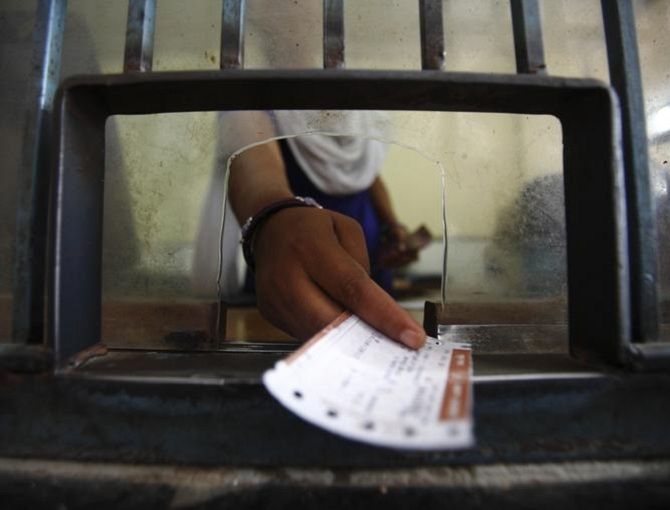 | « Back to article | Print this article |
Shine Jacob & Karan Choudhury highlight the red flags raised by the Controller General of Accounts.

At a time when the Narendra Modi-led government is pushing for digital transactions, the Controller General of Accounts (CGA), under the finance ministry, has raised the red flag on purchasing train tickets over the counter through the e-wallet.
According to sources close to the development, the CGA has rejected the proposal of the ministry of railways, saying that if the e-wallet is used, there is no proper mechanism to monitor how the money will flow back to the government accounts.
On the other hand, it has accepted the proposal on accepting the wallet for online and application-based transactions on condition that railway subsidiary Indian Railway Catering and Tourism Corporation (IRCTC) makes the government an advance payment.
The wallet takes about a day to credit the amount to IRCTC. General merchants get the payment in about a week.
Since the CGA cleared the IRCTC route, the railway ministry launched an IRCTC Rail Connect application on January 10, providing a payment gateway linked to more than 40 banks to facilitate payments through net banking, credit cards, debit cards and the wallets of Paytm, PayU, Mobikwik and IRCTC.
"We will start accepting other wallets like SBI Buddy also very soon," an official said.
The rejection of the proposal to accept the e-wallet for tickets over the counter comes when the government has lined up incentives for digital transactions. These include not levying the service charge for tickets booked through IRCTC till March, a 0.5 per cent discount on season tickets purchased digitally for suburban trains, a 5 per cent rebate on online payments for availing of services such as e-catering and online booking for retiring rooms, and a free insurance of ₹10 lakh for reserved tickets booked online till March 31.
The waiving of the service charge will cost ₹500 crore on an annualised basis, borne equally by IRCTC and the railways.
"In addition to this, not levying the merchant discount rate (MDR) is likely to cost the company ₹100 crore," said an official close to the development.
According to an IRCTC spokesperson, for tickets of non-air conditioned classes the service charge comes to around ₹20 a ticket, while that of the air-conditioned class it is around ₹40. This is likely to wipe out the profits of the public sector undertaking, which had earned a net profit of only Rs 189 crore in FY16 and Rs 131 crore in 2014-15.
Mobile wallet players such as Paytm, Oxigen and Mobikwik are giving payment-related solutions to the railways. After demonetisation, many are in talks with the railways to make stations compatible with digital payments solutions, if not cashless.
Industry insiders say the CGA's concerns can be addressed and they may approach the organisation to explain their digital solutions. "All these concerns are coming up because we are part of a new set of technology providers. We are more accountable than cash can ever be. That is why the government is pushing for digital. If need be, we will show the CGA the way the money spent by passengers can make its way back to government coffers," said a senior vice-president of a Delhi-based payments wallet.
In the 50 days since demonetisation, the share of cashless transactions in the passenger segment zoomed from 38 per cent to 50.5 per cent; it is still increasing on a daily basis.
The value of cashless transactions on the Passenger Reservation System has jumped from ₹49 crore daily to ₹69 crore now. The railways is seeking more than 30,000 point-of-sale machines from banks to enable digital payments at its counters. Before demonetisation, there were 72 ticket counters with POS machines, but now there are more than 2,000.